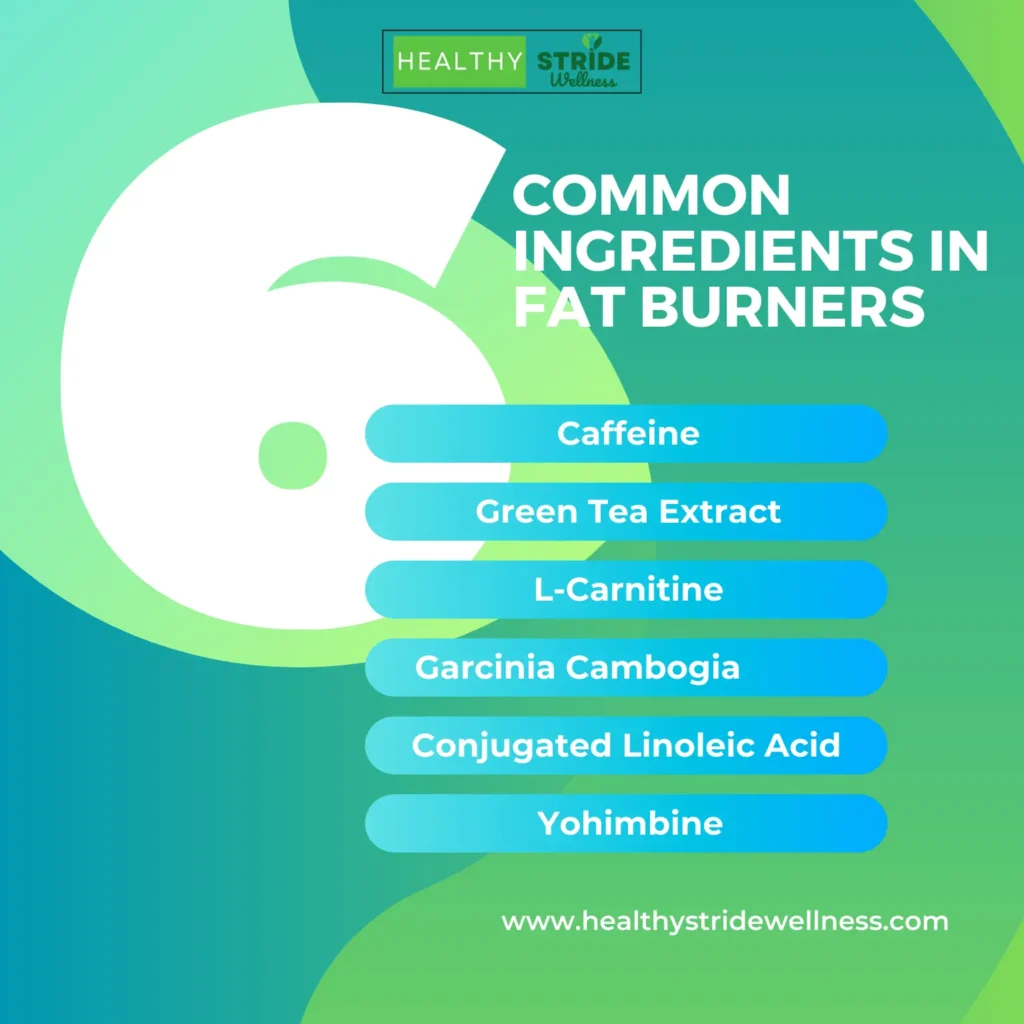Fat Burners Explained: Do They Really Work?

Welcome to Healthy Stride Wellness! We’re excited to bring you this comprehensive blog on fat burners. As the popularity of weight loss supplements continues to grow, many are curious about the role fat burners play in shedding pounds.
Are these supplements the magic bullet for weight loss, or are they just another gimmick in the diet industry? In this article, we’ll dive deep into what fat burners are, how they claim to work, their effectiveness, and whether they’re worth considering in your weight loss journey.
Table of Contents
Key Takeaways
- Fat burners can support weight loss when combined with a healthy lifestyle, but they are not a quick fix.
- The effectiveness of fat burners is influenced by their ingredients and how they are used alongside diet and exercise.
- Achieving lasting weight loss involves looking at the big picture. It’s not just about what you eat; it’s about finding a balance with your diet, keeping active, and living healthily.
What Are Fat Burners?
Fat burners are supplements created to help your body burn fat more effectively. They are typically composed of natural or synthetic ingredients that claim to boost metabolism, increase energy expenditure, reduce appetite, and enhance fat oxidation. These supplements are available in various forms, including pills, powders, and liquids.

Common Ingredients in Fat Burners
The key to how well a fat burner works is mainly the ingredients it contains. Here are some of the most common components found in fat burners:
| Caffeine | A well-known stimulant that can increase metabolism and enhance fat burning during exercise. Caffeine also helps improve focus and energy levels, making it easier to stay active. |
| Green Tea Extract | Green tea extract contains powerful antioxidants called catechins. It is thought to help speed up your metabolism and encourage your body to burn fat. |
| L-Carnitine | An amino acid that plays a crucial role in transporting fatty acids into cells to be burned for energy. It’s often included in fat burners to enhance fat metabolism. |
| Garcinia Cambogia | A tropical fruit extract that contains hydroxy citric acid (HCA), which is believed to suppress appetite and block fat production. |
| CLA (Conjugated Linoleic Acid) | A type of fat found in meat and dairy products that is thought to help reduce body fat and increase lean muscle mass. |
| Yohimbine | An extract from the bark of the Yohimbe tree, yohimbine is often included in fat burners for its potential to increase fat breakdown, particularly in stubborn areas like the abdomen. |
How Do Fat Burners Claim to Work?
Fat burners claim to aid weight loss through several mechanisms. Let’s explore how they are supposed to work:
1. Thermogenesis
Thermogenesis is the process of heat production in the body, and it’s one of the primary ways fat burners claim to increase calorie expenditure. Ingredients like caffeine, green tea extract, and capsaicin (found in chili peppers) are thermogenic agents that can slightly raise your body temperature, leading to increased calorie burn.
2. Appetite Suppression
Another common claim is appetite suppression. Fat burners like glucomannan, a natural fiber, expand in the stomach to create a feeling of fullness, helping you eat less. Other ingredients, such as Garcinia Cambogia, are believed to reduce cravings by influencing the brain’s serotonin levels, which can control hunger.
3. Fat Oxidation
Fat oxidation refers to the process of breaking down fatty acids for energy. Ingredients like L-carnitine and green tea extract are included in fat burners to enhance this process, especially during exercise. The idea is that by increasing fat oxidation, the body will use more fat for fuel, leading to fat loss over time.
4. Increased Energy and Focus
Fat burners often contain stimulants like caffeine, which can boost energy levels and improve mental focus. This can be particularly beneficial during workouts, helping you exercise more intensely and for longer periods, which in turn supports fat loss.
The Science Behind Fat Burners: Do They Really Work?
While the claims made by fat burner manufacturers are enticing, the scientific evidence supporting their effectiveness varies. Now, let’s examine in more detail some essential components and the studies supporting them:
1. Caffeine
Caffeine is one of the most studied ingredients in fat burners. It has been shown to increase metabolism and enhance fat burning during exercise. A study published in the American Journal of Clinical Nutrition found that caffeine can increase the metabolic rate by 3-11%, leading to increased calorie expenditure. However, the effect is dose-dependent, and tolerance can build up over time, reducing its effectiveness.
2. Green Tea Extract
Green tea extract, particularly its catechins, has been shown to promote fat oxidation. A study in the International Journal of Obesity found that green tea extract can increase fat burning during exercise and improve overall weight loss outcomes. However, the effects are modest, and green tea extract is most effective when combined with other fat-burning strategies.
3. L-Carnitine
L-carnitine’s role in fat metabolism is well-documented, but its effectiveness as a fat burner supplement is still debated. Some studies suggest that L-carnitine supplementation can increase fat oxidation and reduce fatigue during exercise, while others find little to no effect on weight loss. The benefits of L-carnitine may be more pronounced in individuals with low levels of this amino acid, such as vegetarians.
4. Garcinia Cambogia
Garcinia Cambogia gained popularity as a weight loss supplement due to its supposed ability to block fat production and suppress appetite. Yet, the proof that shows how well it works is a bit confusing. Some studies show a slight weight reduction, while others find no significant impact. The overall effect of Garcinia Cambogia on weight loss is likely minimal.
Potential Risks and Side Effects of Fat Burners
While fat burners can offer some benefits, they are not without risks. Let’s talk about some possible side effects and things to be aware of:
1. Stimulant-Related Side Effects
Many fat burners contain stimulants like caffeine, which can cause side effects such as jitteriness, anxiety, insomnia, and increased heart rate. For individuals sensitive to stimulants, these side effects can be particularly pronounced and may outweigh the potential benefits.
2. Digestive Issues
Ingredients like glucomannan and other fibers can cause digestive discomfort, including bloating, gas, and diarrhea. It’s important to start with a low dose and increase gradually to assess your tolerance.
3. Potential for Over-Reliance
Relying on fat burners without making lifestyle changes can lead to disappointment. Fat burners should not be used as a replacement for maintaining a balanced diet and staying active. Remember, they work best alongside a healthy lifestyle that includes proper nutrition and regular physical activity. Over-reliance on these supplements can create unrealistic expectations and may hinder long-term weight loss success.
4. Interactions with Medications
Some fat burner ingredients can interact with medications, particularly those for heart conditions, high blood pressure, and mental health disorders. Make sure to talk to a healthcare provider before trying any new supplement, particularly if you’re on prescription drugs.
Are Fat Burners Worth It?
Given the potential benefits and risks, you may wonder if fat burners are worth considering. Let’s talk about a couple of things you should remember:
1. Realistic Expectations
Fat burners are not magic pills. They can support your weight loss efforts, but they are not a standalone solution. To achieve lasting results, fat burners should be used in conjunction with a balanced diet, regular exercise, and healthy lifestyle habits.
2. Quality of Ingredients
Not all fat burners are created equal. The quality and concentration of ingredients vary widely between products. Look for supplements from reputable manufacturers that use clinically studied ingredients in effective doses.
3. Short-Term vs. Long-Term Use
Fat burners are best used as a short-term aid, particularly when you need an extra boost to break through a weight loss plateau. Long-term use of fat burners is not recommended, as it can lead to tolerance, dependence, and diminished effectiveness.
Alternatives to Fat Burners
If you’re hesitant about using fat burners, there are other strategies to support your weight loss goals:
1. Nutrient-Dense Diet
Concentrate on eating whole, nutrient-packed foods that have lots of fiber, protein, and good fats. These foods can help regulate appetite, support metabolism, and provide sustained energy throughout the day.
2. Regular Physical Activity
Mixing both cardio workouts and strength training in your routine can be beneficial. Exercise not only burns calories but also helps build lean muscle, which can increase your resting metabolic rate.
3. Mindful Eating
Improve your eating habits by being more mindful. Listen to your body’s cues for hunger and fullness, take your time when eating, and try not to get distracted while you’re having your meals. This can help prevent overeating and promote better digestion.
4. Adequate Sleep
Getting enough sleep is crucial for weight management. When you don’t get enough sleep, it can mess with your hormones that control hunger, making you want to eat more and potentially overeat.
In Conclusion
Welcome to Healthy Stride Wellness! We’ve brought you this blog to provide an in-depth look at fat burners and their role in weight loss. While fat burners can offer some support, they are not a replacement for a healthy diet and regular exercise. Sustainable weight loss requires a holistic approach that includes a balanced lifestyle, realistic expectations, and a commitment to long-term habits.
Looking for effective weight loss strategies? Visit Healthy Stride Wellness for expert insights and tips. Read our blog now!
FAQs
Are fat burners safe to use?
Fat burners can be safe when used according to the instructions and in moderation. However, they may cause side effects, particularly in individuals sensitive to stimulants. Before trying any new supplement, it’s always a good idea to talk to your healthcare provider.
How long should I take fat burners?
Fat burners are typically recommended for short-term use, usually 4-6 weeks. Prolonged use can lead to tolerance, diminishing their effectiveness, and increasing the risk of side effects.
Can I rely on fat burners alone for weight loss?
No, fat burners should not be relied upon as the sole method for weight loss. They can complement a healthy diet and exercise routine but are not a substitute for a balanced lifestyle.
Please Note: Healthy Stride Wellness provides educational content and is not a replacement for medical advice. Consult a healthcare provider for any health issues.




